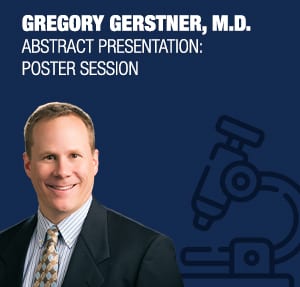Illinois CancerCare Featured at ASCO 2021

June 4 – 8, 2021 | The American Society of Clinical Oncology (ASCO) is hosting its 2021 ASCO Annual Meeting virtually. ASCO is the world’s leading professional organization of physicians and oncology professionals dedicated to conquering cancer through research, education, and quality patient care. Over 40,000 health professionals from around the world attend this annual meeting to review and discuss cutting-edge cancer research, life-changing therapies, and state-of-the-art treatments.
Each year thousands of research abstracts are submitted with high hopes of being featured during this prestigious conference. Abstracts (short summary of research) of superior quality are selected by the ASCO Scientific Program Committee for presentation at the Annual Meeting and for publication in the ASCO Annual Meeting Proceedings, a supplement to the Journal of Clinical Oncology.
We are excited to share Illinois CancerCare had THREE research abstracts selected for this year’s meeting!
Advanced Non-Small Cell Lung Cancer: Retrospective Analysis
Effect of PDL1 expression on overall survival in patients with metastatic adenocarcinoma lung: Illinois CancerCare analysis.
PURPOSE:
PDL1 (Programmed Death Ligand 1) is a protein that helps keep the body’s immune system from attacking non-harmful cells. Some cancer cells have high amounts of PDL1, allowing them to escape an attack by the immune system. PDL1 testing can determine the amount of PDL1 proteins present on the cancer cells. Several different types of cancers are known to have high levels of PDL1 – including lung cancer. Does the presence of PDL1 proteins on the cancer cells affect a patient’s survival? The answer to this question is unclear and is often debated amongst healthcare professionals. Illinois CancerCare, one of the largest private oncology and hematology practices in the Midwest, conducted an in-depth review to evaluate if PDL1 impacted the survival of their advanced lung cancer population.
PRIMARY FINDINGS:
Researchers evaluated over 100 patients with PDL1 testing results available. Results from this investigation indicate that PDL1 expression (high versus low & positive versus negative) has no significant impact on the survival of advanced lung cancer patients.
———
Advanced Non-Small Cell Lung Cancer: Retrospective Analysis
Prevalence of molecular biomarkers expression in patients with metastatic adenocarcinoma lung: Illinois CancerCare analysis.
PURPOSE:
Molecular Biomarkers are biological features found within the body that can be a sign of good health or an indicator of a condition or disease. Oncologists often utilize specific molecular biomarkers to determine the best treatment regimen for their advanced lung cancer patients. To date, there is little information on the prevalence of molecular biomarkers in the United States’ Midwestern population. A study was conducted at Illinois CancerCare, one of the largest private oncology and hematology practices in the Midwest, to evaluate how many advanced lung cancer patients presented with molecular biomarkers in 2018.
PRIMARY FINDINGS:
Molecular Biomarkers of interest include Programmed Death Ligand 1 (PDL1), Epidermal Growth Factor Receptor (EGFR), Anaplastic Lymphoma Kinase (ALK) and ROS1. Results show that patients at Illinois CancerCare had a slightly lower incidence of advanced lung cancer patients positive for the PDL1 protein (PDL1+) when compared to data available. The frequency of the other molecular biomarkers was consistent with previous study findings.
FROM DR. GOMEZ:
“The use of next generation sequencing to identify potential targeted mutations has drastically changed our current treatment of patients with targeted mutations. One of these targets is the PDL-1 mutation in adenocarcinoma of the lung. As part of ILCC research internship during the summer months, high school student Nikhil Kumar examined the prevalence of a molecular biomarker PDL-1 expressed on metastatic adenocarcinoma of the lung patients treated at ILCC and evaluated the effect of this biomarker on the overall survival. What he found in a predominately Caucasian Midwest population was a similar high expression of PDL-1 but slightly lower overall expression compared to other studies. In addition, the overall survival of metastatic lung patients were not influenced by this biomarker. Even though expression of this biomarker allows for potentially less toxic treatment, the overall survival of these selected patients was dependent on multiple other factors such as performance status, prior treatments, comorbidities, social and economic factors that can influence their overall survival. These results emphasize that the patient as a whole must be taken into consideration when prognosticating expected survival outcomes from treatment recommendations.”
 Advanced Non-Small Cell Lung Cancer: Phase 1
Advanced Non-Small Cell Lung Cancer: Phase 1
A phase 1 study of an off-the shelf, multi-neoantigen vector (ADXS-503) in subjects with metastatic non-small cell lung cancer (NSCLC) progressing on pembrolizumab as last therapy.
PURPOSE:
This clinical trial evaluates ADXS-503, a new possible immunotherapy treatment for advanced non-small cell lung cancer (NSCLC) following disease progression. In part B of this trial, ADXS-503 is administered in combination with another immunotherapy drug – Pembrolizumab. ADXS-503 and Pembrolizumab work in different ways to enhance the immune system’s ability to recognize and attack cancer cells. This phase 1 research trial evaluates the overall safety and effectiveness of this treatment combination by learning how these drugs work together in the body.
PRIMARY FINDINGS:
The addition of ADX-503 to Pembrolizumab was well tolerated by all study participants. The results currently show that this new treatment combination has the ability reduce the amount of cancer within the body or prevent it from worsening. Enrollment to this trial continues as researchers further explore additional benefits of this treatment regimen for advanced lung cancer patients.
FROM DR. GERSTNER:
“Immunotherapy has been one of the biggest breakthroughs in oncology in the past decade. It has transformed our care for our patients. One of the many remaining obstacles, however, is when patients develop resistance to these treatments. This trial, using a bio-engineered bacteria, has shown that patients can achieve renewed responses by getting their immune systems to better recognize and attack the cancer cells. We’re excited that this could represent one of the first treatments for patients with relapsed disease following initial immunotherapy and very excited to be able to offer it to our patients in Central Illinois.”




